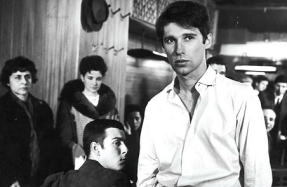Out of the Inkwell
Like many of Kim Deitch’s sprawling, rambunctious graphic novels, his latest spans the long first century of cinema. Reincarnation Stories begins with an elderly D.W. Griffith, tight on whiskey in ’40s L.A. and lamenting for Hollywood’s “yesterday,” and ends with a feline YouTube phenom starring in a Tom Cruise blockbuster. Deitch’s books often repeat this pattern, leaping back and forth from the beginnings of cinema—Mélièsian “attractions” of the 1900s, adventure serials of the 1910s, silent Westerns, early sound cartoons—to our transmedia present, when these once-vital arts languish forgotten by all but a few devotees and lunatics. The artist’s interests in neglected popular art are broad—he digs into the background of everything from bottle-cap art to kids’ TV hosts to Jazz Age stuffed toys—but his movie madness is always central to his work, as is his own role as a collector, historian, memoirist, and raconteur. His best books, Reincarnation Stories included, delight in digging up fantastic celluloid lore—sometimes real, but often invented—and inserting himself into that mythos.
Deitch began his cartooning career in the New York underground press of the late ’60s, first as a contributor to the ’s comix section, and then as its editor. The artist’s creaky, effortful, wild-eyed style was tinged with the innocence of vintage cartoons: his main recurring star, Waldo, is a ropy, randy, Felix-like cat, mischievous to the point of being demonic. His heavily hatched drawing and daffy cast of characters decorated dozens of underground anthologies throughout the ’60s boom and into the ’70s bust, including Art Spiegelman and Bill Griffith’s prestigious and his own solo title, . In the ’80s, however, Deitch came into his own, spinning out a series of graphic novels that distinguish him, along with Robert Crumb and precious few others, as one of the only legends of underground cartooning still possessed of career longevity (collected 1987)—a tale of Tinseltown has-beens and never-weres featuring a characteristic Deitchean menagerie of past-their-prime actors, tormented visionaries, roughand-tumble louts, disillusioned , true believers, circus folk, charlatans, kooks, fanatics, and drunks—sees the artist first finding the broad canvas he needs to portray his intricate histories. (collected 2002) zeroes in on the heyday of animation, from Winsor McCay to the Fleischer brothers, as the storm clouds of Disneyfication gather; (collected 2006) posits a cuckoo shadow history of the early days of cinema, complete with a deadly nitrate fire and a foundling girl whisked away to stardom; while (collected 2007) and (2013) recount the making of 1910s serial adventure films that are fired by unlikely missionary zeal.
You’re reading a preview, subscribe to read more.
Start your free 30 days





